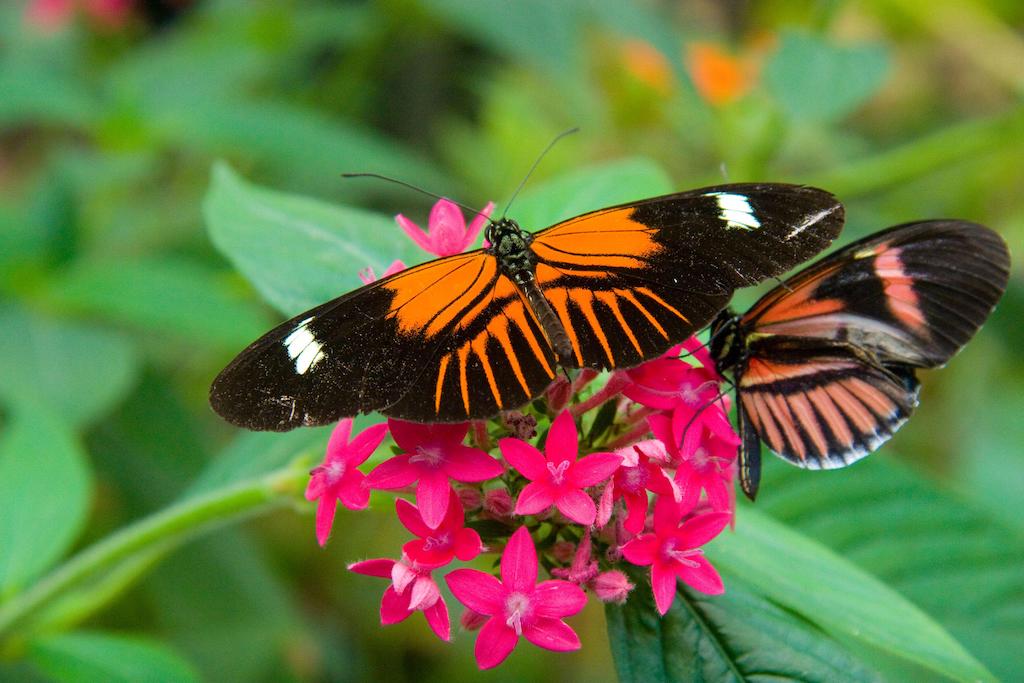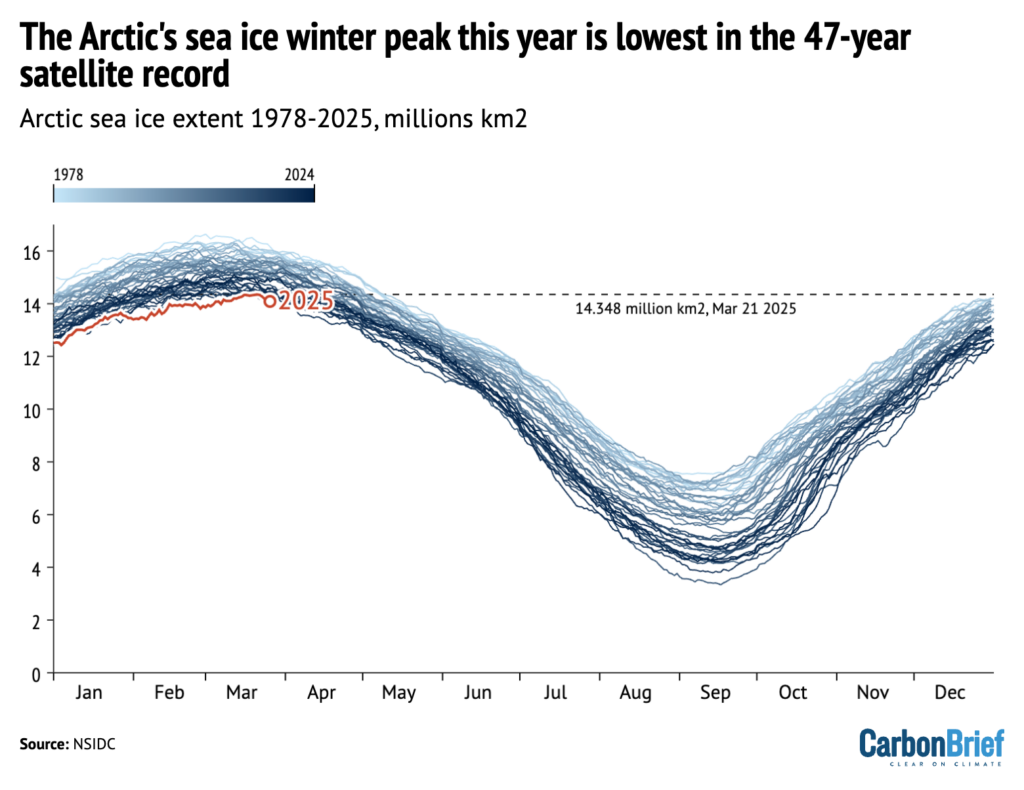
DeBriefed 28 March 2025: South Korea’s record-breaking wildfires; Arctic sea ice hits record-low peak; Butterfly biodiversity imperilled
Giuliana Viglione
03.28.25Giuliana Viglione
28.03.2025 | 2:34pmWelcome to Carbon Brief’s DeBriefed.
An essential guide to the week’s key developments relating to climate change.
This week
Raging wildfires
SOUTH KOREAN BLAZE: Wildfires in south-eastern South Korea – the “worst wildfires in its history” – have killed at least 27 people and displaced more than 37,000 from their homes, the Korea Times reported. The Chosun Daily said that the 1,300-year-old Gounsa Temple “was reduced to ashes” and the fire continues to endanger many of the “most prized cultural assets”. A “spate” of recent wildfires in South Korea and Japan have been “linked to climate change”, the Japan Times said.
FUEL TO THE FIRES: Parts of North and South Carolina have been under evacuation orders due to several large, uncontained wildfires, with “millions of downed trees” from September’s Hurricane Helene fuelling the blazes, the Raleigh News & Observer reported. The Guardian added: “Many people in the area are still getting over the hurricane.”
UK climate and energy roundup
DEADLINE DROPPED: The UK’s High Court “agreed to push back the deadline” for the government to modify its “delivery plan” needed to meet its legally binding climate targets, BusinessGreen reported. The plan was published in 2023, but had been “subject to a legal challenge from green groups, which alleged it was not sufficiently detailed”, the outlet added.
‘GREEN SILENCE’: UK chancellor Rachel Reeves made “no mention of green issues” in her spring statement, the Guardian reported, adding that this “silence [came] as a relief” to “green experts”, given cuts announced elsewhere. Meanwhile, the Chinese owner of British Steel “rejected a £500m lifeline offer from the UK government, raising fears about thousands of jobs at the steelmaker”, the Financial Times reported.
Around the world
- IT’S ELECTRIC: Chinese automaker BYD “topped $100bn” in sales of electric vehicles and plug-in hybrids, surpassing electric-only manufacturer Tesla, the Financial Times said. Tesla sales have fallen 49% year-on-year in Europe in 2025, ABC News noted, even as EV sales overall grew 28%.
- CARBON MARKET: China released plans to include its steel, cement and aluminium industries in the country’s carbon-trading market, Reuters reported.
- COAL COMMITMENT: Germany’s incoming coalition “stand[s] by” plans to phase out coal power by 2038, according to a leaked draft reported by Euractiv, which noted the outgoing government had “favoured” 2030.
- POWER SURGE: Record temperatures in 2024 meant “global energy demand surged” last year, according to a report from the International Energy Agency covered by the Wall Street Journal. A record 585 gigawatts of new renewables were added last year, Axios reported, citing International Renewable Energy Agency data.
- SHIP-SHAPE: In Climate Home News, Kenya’s special envoy for climate change, Ambassador Ali Mohamed, “unequivocally” endorsed a proposed carbon levy on emissions from ships.
267
The number of days in 2024 – nearly three-quarters of the year – in which the US was experiencing a “major disaster”, according to analysis of US Federal Emergency Management Agency data by the International Institute for Environment and Development and CNN.
Latest climate research
- Research in the Journal of Environmental Psychology found that political polarisation around climate change becomes more pronounced as countries become wealthier.
- In China, compound hot-dry and hot-wet events became more frequent, long-lasting and intense from 1985 to 2019, with serious implications for crop losses, a new study in Earth’s Future found.
- A study in Environmental Research Letters detailed a machine learning-driven model capable of accurately forecasting marine heatwaves 10 days in advance.
(For more, see Carbon Brief’s in-depth daily summaries of the top climate news stories on Monday, Tuesday, Wednesday, Thursday and Friday.)
Captured
The US National Snow and Ice Data Center announced that Arctic sea ice reached its annual maximum extent on 21 March. At 14.33m km2, the winter peak is the smallest in the 47-year satellite record. Dr Julienne Stroeve, a senior scientist at the NSIDC, told Carbon Brief that the record low “continue[s] the overall long-term decline in the ice cover”.
Spotlight
Warming may turn butterfly hotspots from ‘safe havens to graves’
This week, Carbon Brief covers a new study that mapped and analysed the biodiversity of butterfly species around the world.
Up to a third of butterfly biodiversity “hotspots” will become too warm for the species they host by 2070, according to new research.
The study, which analysed distributional data on more than 12,000 butterfly species, was published this week in Nature Ecology & Evolution.
It found that two-thirds of butterfly species are mountain-dwellers, with mountains holding 3.5 times more butterfly biodiversity hotspots than lowland ecosystems.
The lead author of the paper told Carbon Brief he hopes that the approach laid out in the study will “broadly boost the representation of insects in global ecology and conservation”.

Mapping hotspots
Butterflies are “uniquely well-documented among insects”, Dr Stefan Pinkert, a researcher at Germany’s University of Marburg, told Carbon Brief.
But, even so, “much of this information remain[s] fragmented and inaccessible”, said Pinkert, who led the new study.
Pinkert and his colleagues used a country-level database of butterfly occurrences, along with regional range maps and previously published species-distribution models, to model the distribution of 12,119 butterfly species. They then calculated and mapped the “richness” and “range rarity” of butterfly species around the world.
Species richness was calculated as the number of unique species in the database for a given area. “Range rarity” is inversely proportional to the range size of the species in an area.
For both richness and range rarity, the researchers defined a “hotspot” as the 5% of areas around the world with the highest value of each quantity. They found that only 10% of species richness hotspots and 10% of range rarity hotspots overlap. The study said that this underlines the “limited value” of species-richness hotspots for identifying conservation priorities.
Pinkert told Carbon Brief that he was concerned to find that only 40-45% of butterfly biodiversity hotspots overlap with the biodiversity hotspots of land animals. Land-animal biodiversity has historically “served as main surrogates for defining” priorities for global conservation, he added.
Warming warning
The researchers also found that around two-thirds of all butterfly species they studied live in mountain regions, with species richness peaking at around 2,500 metres elevation and range rarity peaking at 3,500 metres. They noted that, while mountains are known for their species richness, the concentration of butterfly biodiversity is “substantially” higher than it is for other types of organisms, such as plants, birds and reptiles.
They then used climate models to project warming over the next 45 years – as well as how those temperature changes will affect butterfly habitat in the future.
They found that “temperature niche loss” – warming beyond the safe temperature range for species in a given area – would erode up to one-third of species-richness hotspots globally, under a very-high emissions scenario, with some areas losing nearly two-thirds of their hotspot area. Under a moderate emissions scenario, sub-Saharan Africa and south-east Asia would each lose a quarter of their temperature niches.
The loss of safe temperature niches was greater for hotspot areas than non-hotspot areas. The authors concluded that under accelerating warming, mountains might be converted “from safe havens to graves”.
Pinkert told Carbon Brief:
“Our results underscore the urgent need to prioritise insect conservation amid global change…Business-as-usual in prioritisation and implementation [of conservation actions] will threaten ecosystem integrity – the foundation of our well-being and that of future generations.”
Watch, read, listen
TIMELY TREK: Latin America Reports chronicled a journey to visit Colombia’s melting Andean glaciers on the country’s “climate change trail”.
ENERGY OUTLOOK: Kaare Sandholt of top Chinese thinktank the Energy Research Institute talked about the country’s energy transformation outlook – recently covered by Carbon Brief – on the Environment China podcast.
TRUMP-PROOF TOOLS: The Guardian recreated a climate-risk tool that had been purged from the US Federal Emergency Management Agency’s website under Trump’s anti-climate directives.
Coming up
- 2-3 April: 41st UN-Water meeting, Rome
- 7-11 April: Meeting of the Marine Environment Protection Committee of the International Maritime Organization, London
Pick of the jobs
- Earthjustice, legislative director, climate and energy | Salary: $164,000-$182,200. Location: Washington DC
- International Maritime Organization, media and communications associate | Salary: £45,347. Location: London
- UN Environment Programme, finance and budget assistant | Salary: Unknown. Location: Nairobi
DeBriefed is edited by Daisy Dunne. Please send any tips or feedback to [email protected].
This is an online version of Carbon Brief’s weekly DeBriefed email newsletter. Subscribe for free here.




